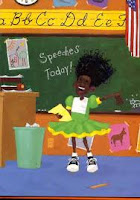 In the text Voices of Our Foremothers: Celebrating the Legacy of African-American Women Educators, a chapter in Reader’s of the Quilt by Joanne K. Dowdy, Sunny-Marie Birney tells of her experiences from being adopted as a small child to finding herself with the help of her African-American female teachers and professors. Adopted at age two by people of Euro-American decent, Birney, a young African-American woman, felt out of place, lonely, and worthless. She makes reference to the negro spiritual Motherless Child- stating that she found herself “a long way from home.” Later majoring in Psychology and Black studies triggered a “cultural and spiritual awakening” which began her journey “home”. This is the point where she decided to focus her efforts to solve issues involving education in the African-American community.
In the text Voices of Our Foremothers: Celebrating the Legacy of African-American Women Educators, a chapter in Reader’s of the Quilt by Joanne K. Dowdy, Sunny-Marie Birney tells of her experiences from being adopted as a small child to finding herself with the help of her African-American female teachers and professors. Adopted at age two by people of Euro-American decent, Birney, a young African-American woman, felt out of place, lonely, and worthless. She makes reference to the negro spiritual Motherless Child- stating that she found herself “a long way from home.” Later majoring in Psychology and Black studies triggered a “cultural and spiritual awakening” which began her journey “home”. This is the point where she decided to focus her efforts to solve issues involving education in the African-American community.Birney goes on to mention three African-American female college professors that made a lasting impression on her life. From these professors, she gained an understanding of her place in the world and the world as it relates to academics. These professors inspired and uplifted Birney through their levels of commitment and laudable skills. From these African-American female professors, she felt a sense of care and concern not only having to do with her studies but care and concern for her general well being. These women inspired her calling to serve the African-American community through teaching.
 A definition of service by Carter G. Woodson explains that service is a necessary part of life. Author-Freire speaks on the importance of service and how it is beneficial to both the students and teachers. He explains a style of education “for the practice of freedom” called liberation education. It involves stimulating the mind through communication as opposed to just giving information. Like Freire, another author- bell hooks describes education as a practice of freedom. Birney, looking back on her career as a student, agrees with Freire and hooks in their understandings of education. Birney’s African-American female teachers and professors throughout her student-hood illustrated the idea that education is about how students could grow as individuals and not just about how much information students can memorize.
A definition of service by Carter G. Woodson explains that service is a necessary part of life. Author-Freire speaks on the importance of service and how it is beneficial to both the students and teachers. He explains a style of education “for the practice of freedom” called liberation education. It involves stimulating the mind through communication as opposed to just giving information. Like Freire, another author- bell hooks describes education as a practice of freedom. Birney, looking back on her career as a student, agrees with Freire and hooks in their understandings of education. Birney’s African-American female teachers and professors throughout her student-hood illustrated the idea that education is about how students could grow as individuals and not just about how much information students can memorize. Just as we have come to a new understanding of literacy, this text sheds light on an understanding of education that is not dominantly recognized either. Most people would agree that students are more deeply affected by teachers and professors who seem to care about them. It is mentioned in this text that more African-American female teachers and professors show their concern for students than other teachers and professors. They show their dedication and push their students to reach levels of success that they may not have even thought of before their encounters with these teachers. This text brought more appreciation for the efforts of African-American female teachers and professors.
Just as we have come to a new understanding of literacy, this text sheds light on an understanding of education that is not dominantly recognized either. Most people would agree that students are more deeply affected by teachers and professors who seem to care about them. It is mentioned in this text that more African-American female teachers and professors show their concern for students than other teachers and professors. They show their dedication and push their students to reach levels of success that they may not have even thought of before their encounters with these teachers. This text brought more appreciation for the efforts of African-American female teachers and professors.
No comments:
Post a Comment